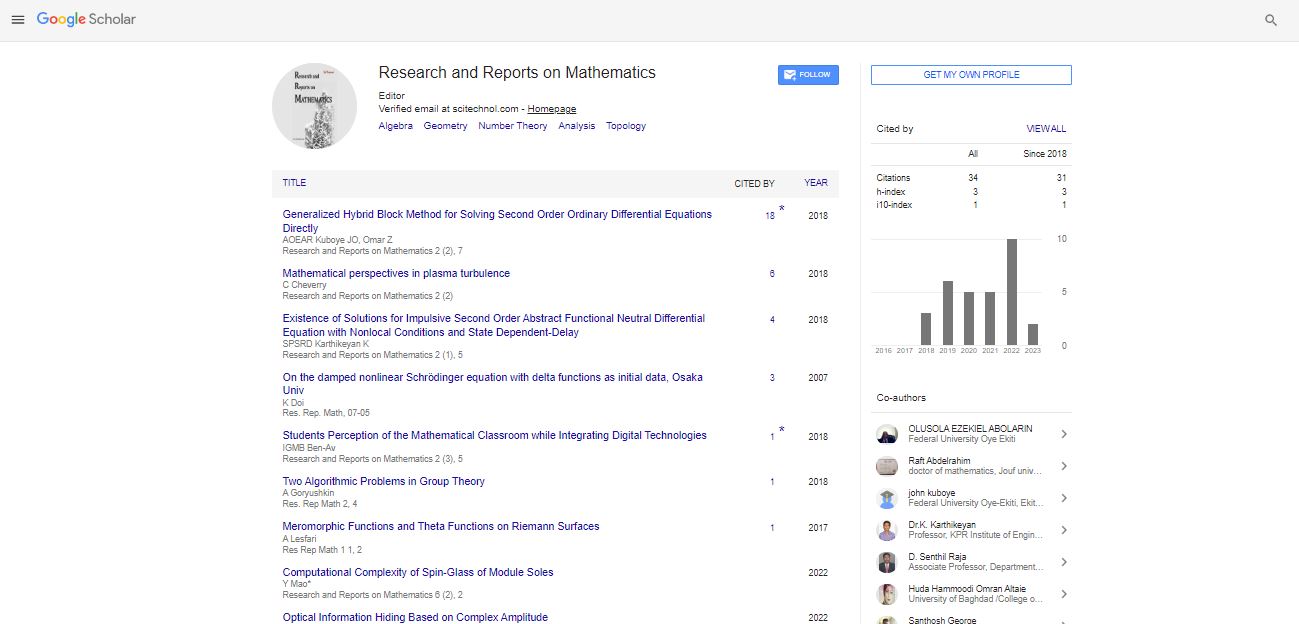Editorial, Res Rep Math Vol: 5 Issue: 7
Editor's Note on Variable Based Math
Nicolas Andruskiewitsch*
Department of Mathematics, Public University of Cordoba, Argentina
- *Corresponding Author:
- Nicolas Andruskiewitsch
Department of Mathematics, Public University of Cordoba, Argentina
E-mail: nicolas2231@gmail.com
Received Date: July 18, 2021; Accepted Date: July 23, 2021; Published Date: July 23, 2021
Citation: Andruskiewitsch N (2021) Editor’s Note on Variable Based Math. Res Rep Math 5:7. e126.
Copyright: © All articles published in Research and Reports on Mathematics are the property of SciTechnol, and is protected by copyright laws. Copyright © 2021, SciTechnol, All Rights Reserved.
Keywords: Theoretical polynomial math,bunch hypothesis
Editorial
François Viète’s work on new variable based math at the end of the sixteenth century was a significant stage towards present day variable based math. In 1637, René Descartes distributed La Géométrie, designing logical math and presenting current logarithmic documentation. One more key occasion in the further improvement of polynomial math was the overall mathematical arrangement of the cubic and quartic conditions, created during the sixteenth century. The possibility of a determinant was created by Japanese mathematician Seki Kōwa in the seventeenth century, followed autonomously by Gottfried Leibniz ten years after the fact, to tackle frameworks of synchronous straight conditions utilizing grids. Gabriel Cramer likewise accomplished some work on lattices and determinants in the eighteenth century. Changes were concentrated by Joseph-Louis Lagrange in his 1770 paper “Réflexions sur la résolution algébrique des équations” gave to arrangements of mathematical conditions, in which he presented Lagrange re solvents. Paolo Ruffini was the primary individual to foster the hypothesis of stage gatherings, and like his archetypes, additionally with regards to tackling arithmetical conditions. Theoretical polynomial math was created in the nineteenth century, getting from the interest in settling conditions, at first zeroing in on what is currently called Galois hypothesis, and on constructibility issues. George Peacock was the originator of aphoristic intuition in math and polynomial math. Augustus De Morgan found connection variable based math in his Syllabus of a Proposed System of Logic. Josiah Willard Gibbs fostered a variable based math of vectors in three-dimensional space, and Arthur Cayley fostered a variable based math of networks (this is a noncommutative algebraAreas of math with the word polynomial math in their name. A few spaces of science that fall under the order unique polynomial math have the word polynomial math in their name; straight polynomial math is one model. Others don’t: bunch hypothesis, ring hypothesis, and field hypothesis are models. In this part, we show a few spaces of math with “polynomial math” in the name.
• Elementary polynomial math, the piece of polynomial math that is normally educated in rudimentary courses of arithmetic.
• Abstract variable based math, in which logarithmic constructions like gatherings, rings and fields are aphoristically characterized and explored.
• Linear variable based math, in which the particular properties of direct conditions, vector spaces and frameworks are considered.
• Boolean polynomial math, a part of polynomial math abstracting the calculation with reality esteems bogus and valid.
• Commutative polynomial math, the investigation of commutative rings.
• Computer polynomial math, the execution of logarithmic techniques as calculations and PC programs. Homological polynomial math, the investigation of logarithmic constructions that are basic to examine topological spaces.
• Universal variable based math, in which properties normal to all arithmetical constructions are considered.
• Algebraic number hypothesis, in which the properties of numbers are concentrated according to a mathematical perspective.
• Algebraic math, a part of calculation, in its crude structure determining bends and surfaces as arrangements of polynomial conditions.
• Algebraic combinatorics, in which mathematical strategies are utilized to contemplate combinatorial inquiries.
• Relational variable based math: a bunch of finitary relations that is shut under specific administrators.
Numerous numerical constructions are called algebras
Algebra over a field or all the more for the most part variable based math over a ring. Rudimentary variable based math is the most fundamental type of variable based math. It is instructed to understudies who are dared to have no information on math past the fundamental standards of number juggling. In math, just numbers and their arithmetical activities, (for example, +, −, ×, ÷) happen. In polynomial math, numbers are frequently addressed by images called factors, (for example, a, n, x, y or z). This is valuable in light of the fact that:
It permits the overall detailing of arithmetical laws, (for example, a + b = b + a for every one of the an and b), and subsequently is the initial step to a deliberate investigation of the properties of the genuine number framework. It permits the reference to “obscure” numbers, the plan of conditions and the investigation of how to settle these. (For example, “Track down a number x with the end goal that 3× + 1 = 10” or going a bit further “Track down a number x to such an extent that hatchet + b = c”. This progression prompts the end that it isn’t the idea of the particular numbers that permit us to settle it, yet that of the tasks in question.) It permits the detailing of practical connections. (For example, “Assuming you sell x tickets, your benefit will be 3× − 10 dollars, or f(x) = 3× − 10, where f is the capacity, and x is the number to which the capacity is applied”.)
 Spanish
Spanish  Chinese
Chinese  Russian
Russian  German
German  French
French  Japanese
Japanese  Portuguese
Portuguese  Hindi
Hindi 